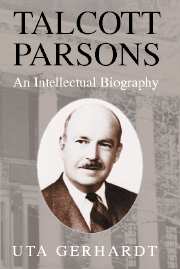Book contents
- Frontmatter
- Contents
- Preface
- 1 Understanding The Structure of Social Action
- 2 Parsons's Sociology of National Socialism, 1938–1945
- 3 The Harvard Social-Science War Effort and The Social System
- 4 A New Agenda for Citizenship: Parsons's Theory and American Society in the 1960s
- Epilogue: A Life of Scholarship for Democracy
- Biblography
- Name Index
- Subject Index
- Plate section
4 - A New Agenda for Citizenship: Parsons's Theory and American Society in the 1960s
Published online by Cambridge University Press: 09 October 2009
- Frontmatter
- Contents
- Preface
- 1 Understanding The Structure of Social Action
- 2 Parsons's Sociology of National Socialism, 1938–1945
- 3 The Harvard Social-Science War Effort and The Social System
- 4 A New Agenda for Citizenship: Parsons's Theory and American Society in the 1960s
- Epilogue: A Life of Scholarship for Democracy
- Biblography
- Name Index
- Subject Index
- Plate section
Summary
Introduction
Harvard historian Arthur Schlesinger, Jr., first insider-analyst of the presidency of John F. Kennedy and later chronicler of Robert Kennedy and His Times, failed to mention Harvard social science when he honored the many contributions from Harvard scholars toward the seminal politics changing American society in the Kennedy era and until 1968.
A recent account taking notice of the merits of social science and also Parsons mainly in the 1960s, Stephen Graubard's retrospect of forty years of Daedalus, the journal of the American Academy of Arts and Sciences, published in 1999, does take account of Parsons's achievements. But Parsons, for Graubard, is only one among a larger group of sociologists who contributed to the success of the Academy and its journal, helping to safeguard the role of science as guardian of cultural knowledge in our civilization. The particular accomplishment of Parsons as a social theorist in the 1960s deserves yet more special mention.
Polemics such as Alvin Gouldner's The Coming Crisis of Western Sociologywhich charged Harvard sociology, and particularly Parsons, with mechanistic thinking, even lack of analytical reflexivity, have unduly clouded recognition of Parsons's “late” oeuvre.
My thesis is that in the course of the 1960s, urged on by the liberal progressivism of theKennedy administration, he thoroughly reformulated his systems theory. His main insight, I suppose, took the then-current changes of scope and structure of societal organization on a national as well as international scale as indicators of major developments in the history of modern democracy.
- Type
- Chapter
- Information
- Talcott ParsonsAn Intellectual Biography, pp. 184 - 275Publisher: Cambridge University PressPrint publication year: 2002



